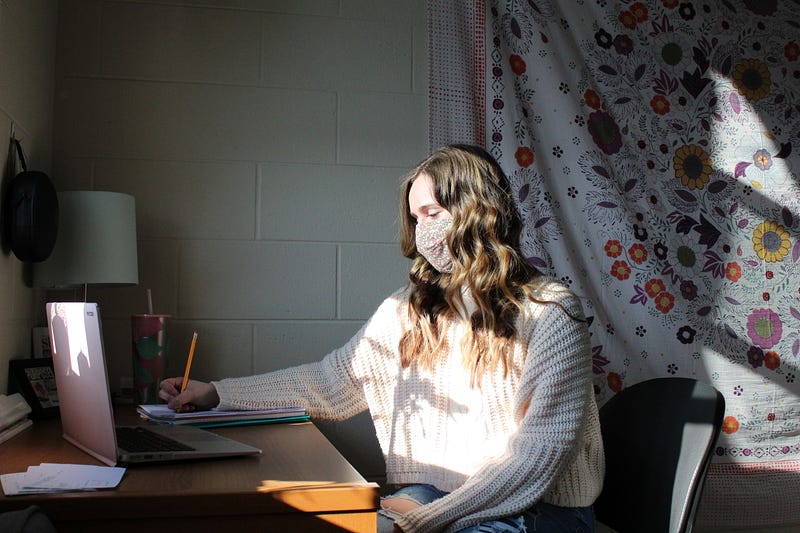This year’s freshman class began their college experience unlike their predecessors. First year mechanical engineering student, Vahagn Yengibaryan, was unable to live in Madison during the fall semester. Instead, Yengibaryan took classes from his native country of Armenia, in a time zone ten hours ahead of Madison. Katie Hickman, a political science student from Germany, was able to live on campus but not without quarantining three separate times when traveling to and from campus and during the lockdown of Sellery and Witte in September of 2020. Other students, especially local students, were able to choose to live on campus and have a somewhat-normal first-year experience in the dorms but not without added challenges. These challenges included increasingly relaxed attitudes toward the pandemic which caused international and legal studies student, Stella D’Acquisto, to move back home to Milwaukee, Wisconsin just five weeks into the fall semester.
When discussing the changes in the “normal” UW-Madison freshman experience, the idea of normal must be explored. For each student across campus, the normal experience varies as people find their priorities and work toward their desired future. It would be an understatement to say that students across campus have identical experiences; factors such as major, course rigor and involvement in extracurriculars can greatly vary from student to student.
Aside from the independence of living away from family, the freshmen discussed a variety of typical experiences that they missed out on due to precautionary measures set in place by UW-Madison. Most freshmen have yet to attend any sort of Badger sporting event and have never set foot in Camp Randall. Additionally, fewer first year students are joining student organizations. In one particular freshman’s experience, by the time you get to the end of the day, you are too “Zoomed Out” to devote more time to online activity- no matter the purpose.
The lack of in-person classes has led to an entire class of students who cannot differentiate between Van Vleck and the Engineering Centers Building without the help of signs or Google Maps. While this problem will be resolved when classes return to an in-person format, some students lack knowledge about available study spaces since they are either off-campus or confined to their dorms or apartments. Another freshman, Grace Bauernfeind, expressed concern about her inability to explore the campus, despite having lived in Madison for the better part of a year. Furthermore, the shift to entirely online classes has made it more difficult to disconnect from school work in the evening. Trinity Manske, who is majoring in dance and nutritional sciences, explained that she found herself spending nearly all of her time during the fall semester doing work for her asynchronous classes — because it was always there. There is almost always something else that can be done, asynchronous Statics lecture videos to watch, Chemistry lectures to rewatch, or code to revise. With everything online, there is always the ability to make progress and it may feel like if work is not being done, then time is being wasted.
Despite all the difficulties of living and transitioning to college in a pandemic, many freshmen shared their positive experiences, important lessons and coping strategies they learned. Students spoke of becoming more introspective and resilient as they were forced time and again to change their expectations that they held for the past year. They also discussed how the online learning format forced them to advocate for themselves better since asking questions about a class or attending office hours requires more effort. Taking breaks, minimizing time on social media, and designating time to step away from computers were some the coping mechanisms that the students shared.
Many freshmen also discussed ways that their plans at UW-Madison changed due to the pandemic. While it is expected and common for plans to change, several students discussed joining the ROTC or adding a second major to add some stability and options for when they graduate. “You can’t exactly be laid off from the military like you can in other jobs,” Hickman points out. Other students expressed how their desire to find internships changed due to the predominantly online format. While remote employment opportunities are certainly easier to accommodate, the downfalls of being online outweigh the benefits for other students.
Above all, the freshmen explained that some of the most beneficial skills they learned from the pandemic were planning and organizing. Life is no longer structured by classes, commute time is non-existent; delays are only caused by Canvas crashing, slow internet connections, or forgetting about dual authentication to sign into meetings. Because of this, planning out time appears to be of the utmost importance to maintaining stability and balance in the lives of freshmen. Although a relatively short amount of time has passed between the freshmen years of 2019 and 2020, their experiences at UW-Madison differed substantially. However, the freshman class’s experiences have led them to gain new and unique skill sets which will benefit them long after the pandemic is over.

